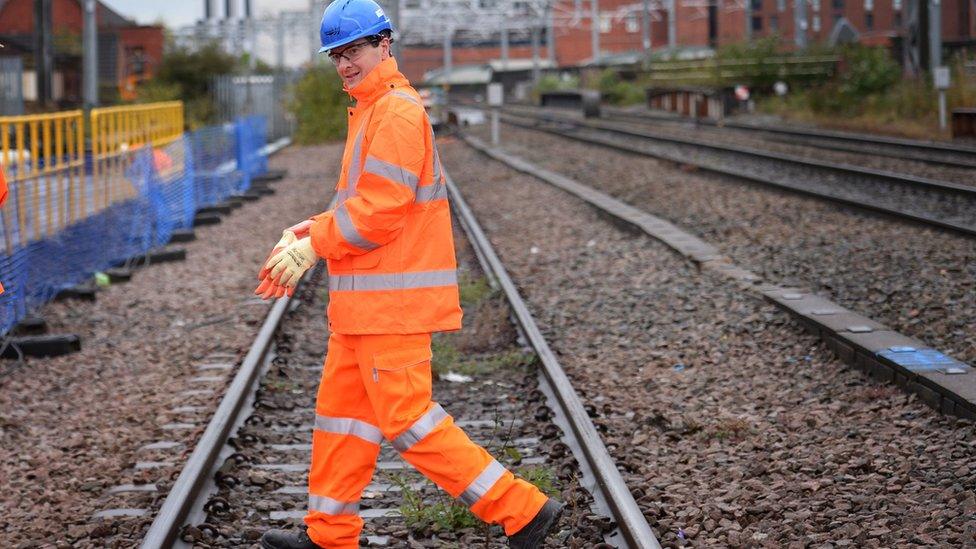The north of England's road and rail commuter woes
- Published
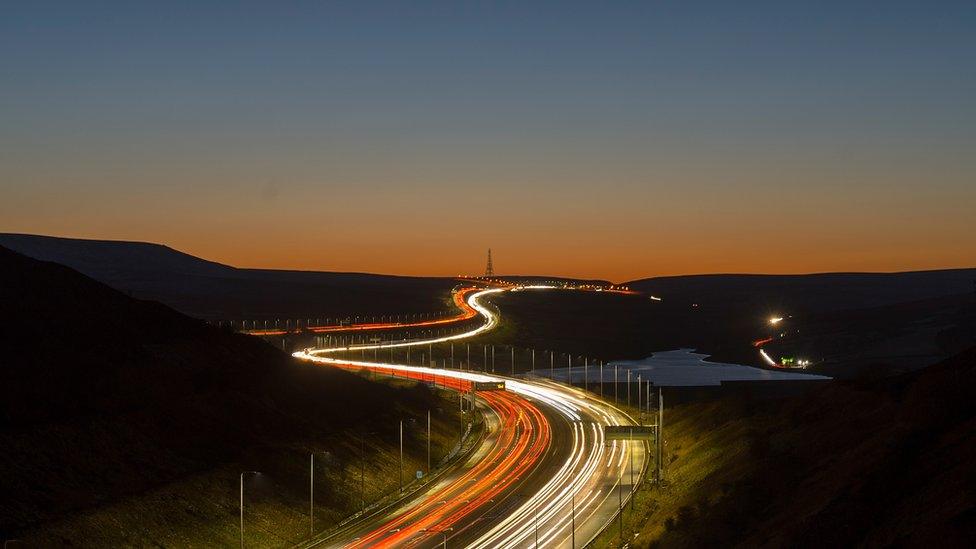
Transport for the North has identified several travel "corridors" which need to be improved
Whether it's brake lights on the M62 as far as the eye can see or standing room only on crammed trains, commuting between cities is an often painful experience in the north of England. As campaigners set out their vision to revolutionise northern travel, what is the daily reality for those struggling to get to work?
Hop on a train from Manchester to London and you can be walking out of Euston station in little more than two hours.
Yet attempt a journey from Liverpool to Hull - half the distance of a jaunt to the capital - and it will take you three.
While links between the two coastal cities may be changed by Northern Powerhouse Rail - dubbed HS3 - commuters say travel between the east and west is a daily, and at often times, interminable grind.
They cite late, slow, outdated trains which offer poor value for money, where in some cases if you miss one service you can be waiting an hour for the next - if it is running at all.
By road, things are scarcely better. At rush hour on the trans-Pennine M62, the road heaves with cars often blighted by poor visibility and freezing temperatures. Add an accident or road works to the mix and what should be an hour's journey between Manchester and Leeds can take several.
As Transport for the North reveals its 30-year, £70bn plan for transforming routes between the cities, improvements cannot come soon enough for some.

Oldham to Leeds
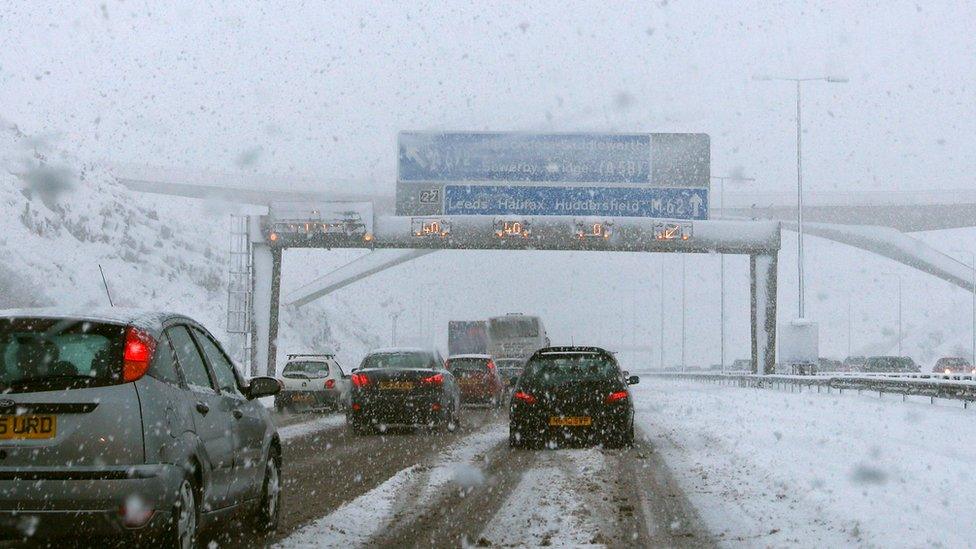
The M62 features the highest point of the country's motorway network
For four years, Colette Burgess spent £300 a month on the 37-mile journey across the Pennines to teach at a primary school in Leeds.
The mother-of-three, who now works from home as a blogger, describes her once-long 13-hour days punctuated by stop-start stints on the M62 as "ridiculous".
"It's not a commute I would recommend to anybody," she says.
"I eventually thought, I can't keep doing this. It impacted my ability to teach, I was so tired.
"Sometimes I would have to stop at the services and close my eyes for ten minutes, especially at that miserable, dark time in winter."

Colette Burgess said she left home at 06:00 to beat the rush, despite not starting work until 08:00
The stretch of motorway over West Yorkshire is known for its steep climbs, barren moorland and the famous farmhouse nestled between its carriageways.
It was initially designed to carry 79,000 vehicles a day but according to Highways England is now used by double that figure.
The extra traffic - sometimes combined with fog, snow or accidents - meant Mrs Burgess's 50-minute commute from Oldham regularly took much longer.
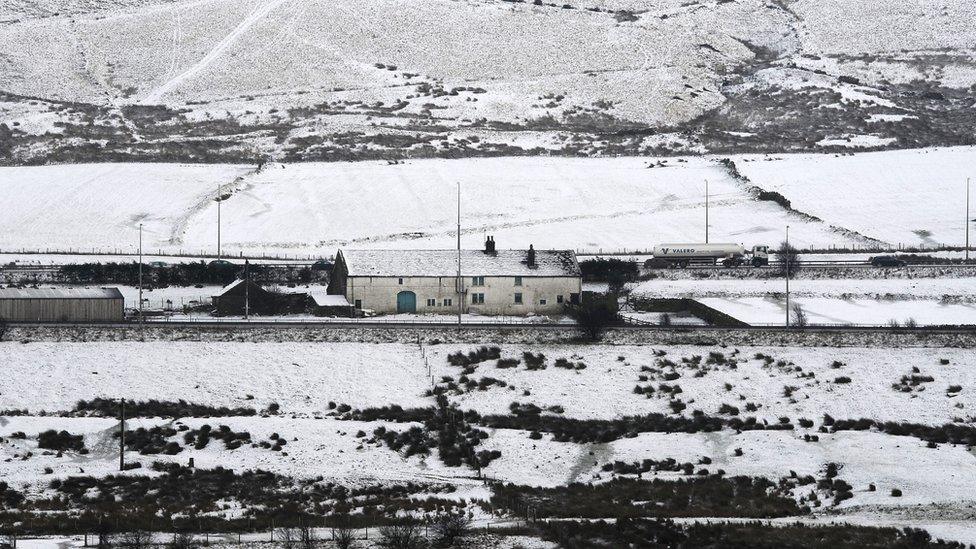
Stott Hall, the farm in the middle of the M62, is a well-known landmark for the motorway's commuters
"Sometimes I was stuck at the top of the motorway for four hours due to the weather or a crash," says the 37-year-old, who continued to live near Oldham because her husband works in Preston.
"I wouldn't get home before 7pm most nights. You tend to switch off from your day on the drive home but as a teacher [I had] to switch back on again to do marking."
Temporary narrow lanes and 50mph speed limits have become a regular feature on the approach to Leeds and the M60 - which circles Greater Manchester and links to the M62 - because of work to upgrade to a smart motorway.
"The smart motorway sections have improved things slightly, but it's just too busy at peak periods of the day and I really don't know how you fix that," she adds.

South Yorkshire to Greater Manchester
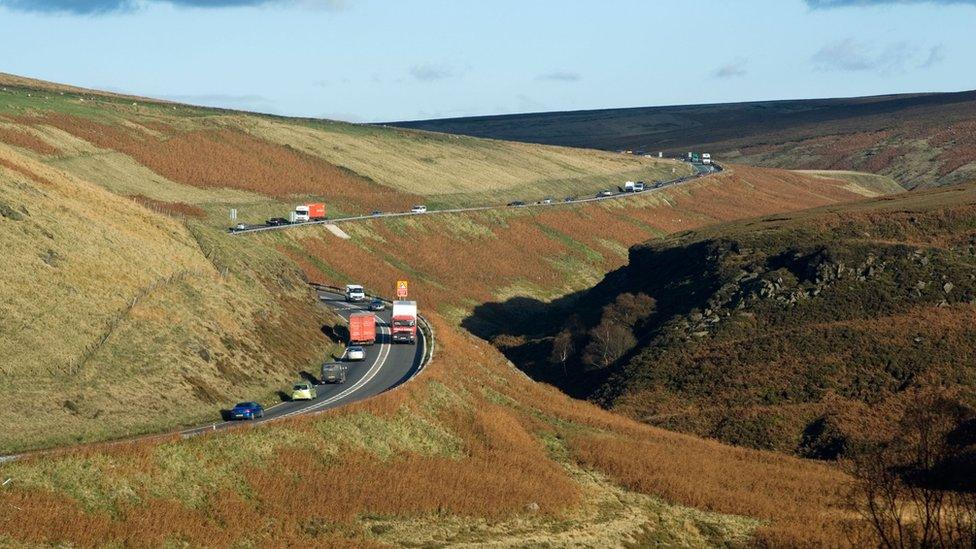
The A628 is a popular route for people driving between Sheffield and Manchester
Fifteen miles south of the traffic heading over the M62 is the Woodhead Pass, which snakes through the Peak District and connects Greater Manchester with South Yorkshire.
The A628, as it is officially called, is known for the often perilous path is cuts through the hills.
When it snows the route is closed, making the journey impossible unless one factors in a lengthy detour via the equally tricky Snake Pass or the M1 and M62.
Its height and exposure also makes it a magnet for high winds, which regularly blows over lorries.
But it is during icy conditions, when the road often remains open, that some of the most treacherous driving conditions are created, according to minibus driver, Lee Morfitt.
"The worst thing now on this windy, unlit, old road is the volume of HGVs and the drainage.
"It's like a skating rink in the winter when water flows down the hillside and freezes."
The 51-year-old, who uses the route to take holidaymakers to Manchester Airport, says he has seen multiple accidents.
"I've seen a wagon which had gone off the road teeter on the edge of a ravine, jack-knifed lorries... I wouldn't want any relative driving over it at night."
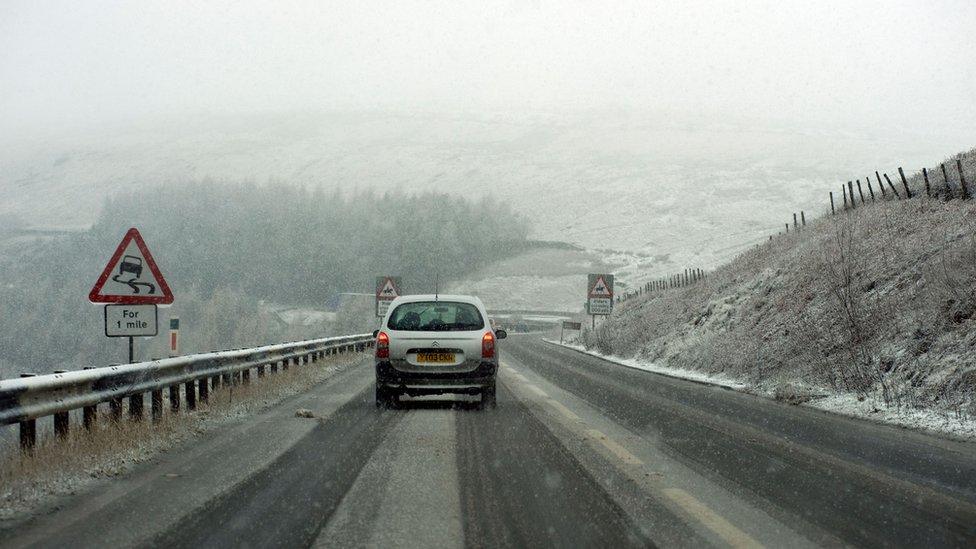
Driving conditions on both the Woodhead Pass and Snake Pass in the Peak District can be tricky during winter
A Highways England report released in 2015 suggested a £6bn scheme to build a road and rail tunnel underneath the Woodhead Pass could create the longest tunnel in Europe.
A scaled-back plan has now been mooted, including a partially-tunnelled route and road improvements, which Transport for the North says is a more "cost-effective solution".
Mr Morfitt, however, remains unconvinced by the idea.
"A tunnel sounds good, but it's not a quick fix, it would be a massive project which takes years - this generation wouldn't see it.
"The road is currently about 30 years behind the times, nothing has been addressed and I'm not convinced it ever will."

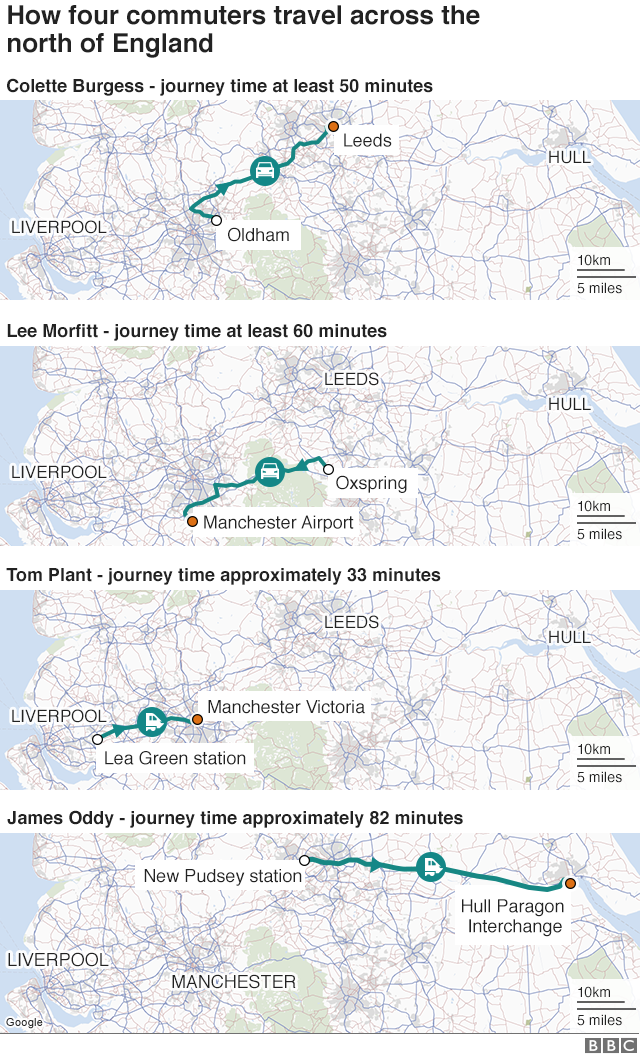

St Helens to Manchester
Tom Plant's morning starts on the platform of Lea Green station with about 100 others, peering down the line for the 08:08 to Manchester Victoria.
Nearby St Helens sits between Liverpool to the west and Manchester to the east. A peak ticket from Lea Green to Liverpool is a 30-minute one-way journey costing £6.10.
Travel the opposite way for 37 minutes to Manchester and it will cost £11.60 - a fact the 30-year-old brewer says "screams inequality".
"I'm in the middle of Liverpool and Manchester... it's the same line, the same trains," he says.
"There have been times where I've got on the delayed 07:45 instead because it's been so late.
"The trains rarely show up on time, commuting is complete irregularity."
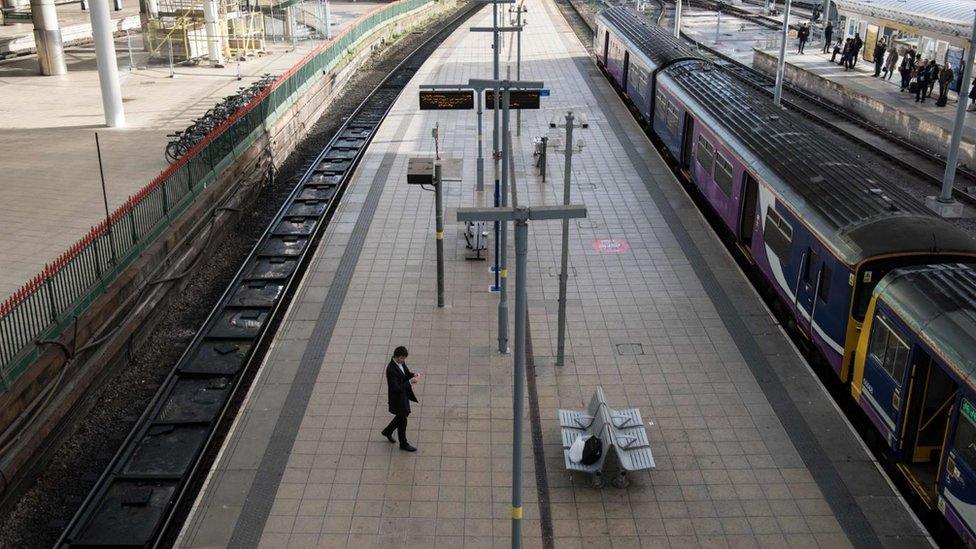
There has been recent industrial action which has affected Manchester Victoria station
Greater Manchester's mayor Andy Burnham recently branded the north's transport system as "outdated, expensive and slow", citing a train journey from Manchester to Chester which now takes "four minutes longer than it did in 1962".
Mr Plant feels the availability of services outside peak hours is another major issue, with the last service home five hours earlier than usual during recent industrial action.
"The last train has been at 18:00, which is OK for people who work in offices but in my line of work I may have to stay later," he says.
"Sometimes it has been cancelled and there are bus replacements."

Leeds to Hull
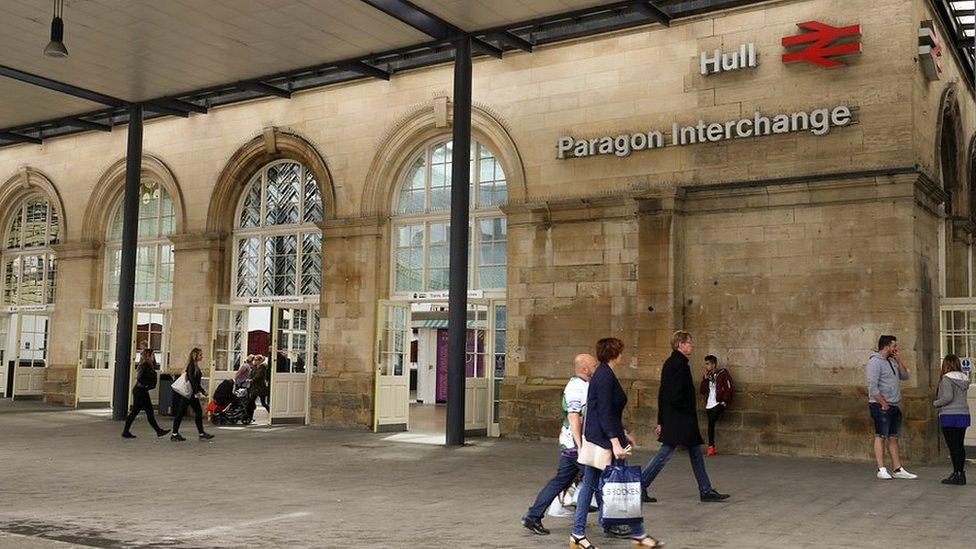
There is only one direct service an hour between Leeds and Hull
James Oddy has taken the train to Hull at various times of the day over the last year for work.
The 27-year-old administrator commutes from New Pudsey and changes at Leeds, where he was shocked to find only one direct service an hour to the former UK City of Culture.
"As it's two of Yorkshire's big cities, I thought [services] would be more frequent," he says.
"When you're seeing people struggling to get on trains at peak times, you can sometimes be dangerously crammed in."
The Northern Powerhouse Rail "vision" includes upgrades to the line between Leeds and Hull, but current proposals are thin on both detail and timescale.

Hull's year as UK City of Culture saw record numbers of visits to some of its tourist attractions
Mr Oddy thinks the north would benefit from an Oyster Card-style system which would help tourists and visitors travel between the cities.
He also believes there is a "real discrepancy" in the ease of travel around the cities themselves, citing Leeds as a particularly "abysmal" example.
"It hampers the north in attracting visitors," he says.
"If you're a foreign tourist I bet it's hard to get your head around the differences between some tickets only being valid with certain bus and train companies.
"We should simplify things and have a pass which could be used across the services."
Transport for the North aims to provide "smart ticketing across rail and bus travel" and a "simplified pricing structure" within four years.
Additional reporting by Kaleigh Watterson
- Published16 January 2018
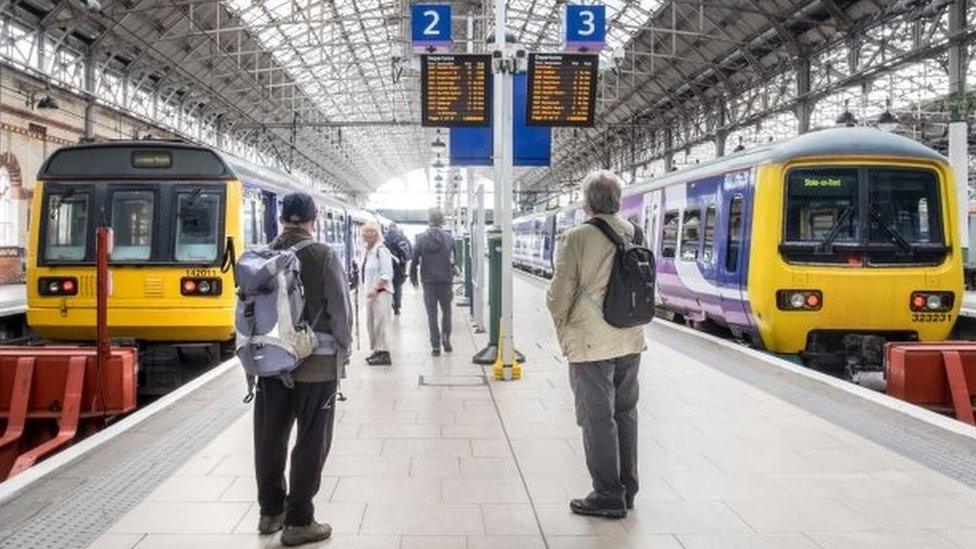
- Published15 December 2017
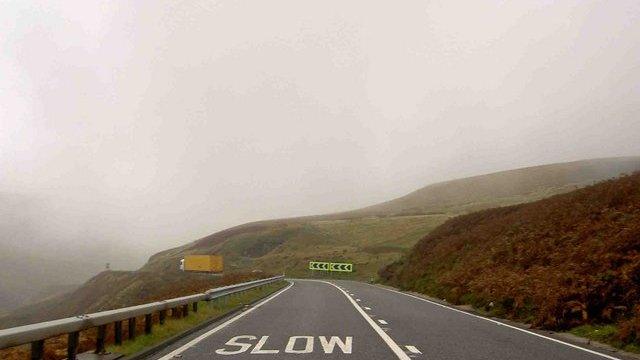
- Published22 August 2017
